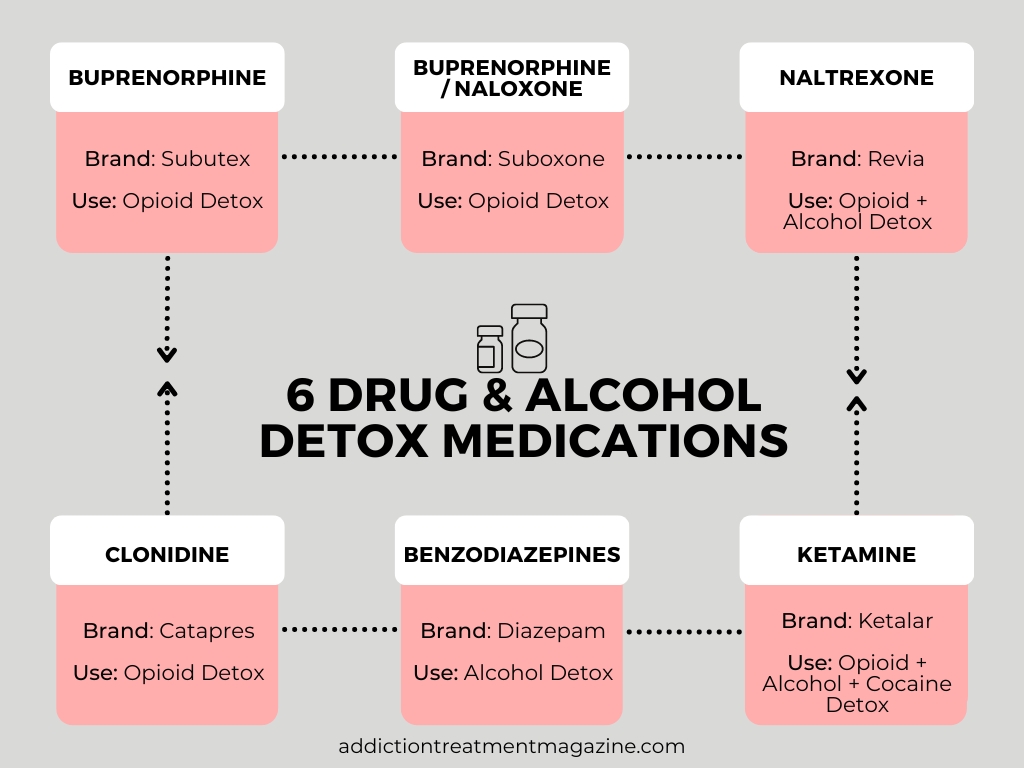The medical and pharmaceutical advances over the past 100 years have lead to the development of numerous medications used to manage drug & alcohol detox. Mixed opinions and information have created a great deal of confusion over which medications are actually good for detox. This is especially true for many of the medications used for opioid and alcohol withdrawal. Like all medical interventions, they do come with an array of risks, but studies have shown that these medications can also be beneficial for individuals struggling to overcome addiction. Keeping in mind that medication-assisted detoxification includes the use of IV fluids, vitamin supplements, and monitoring of vital signs, the decision to use more intense medication should be approached on a case by case bases. You and your loved ones should take the time to understand the risks and benefits of various medication options so that you can make informed decisions on whether or not to accept them as treatment.

Buprenorphine
Approved by the FDA for opioid addiction treatment, buprenorphine is a partial opioid agonist. You may find buprenorphine referred to by its brand name, Subutex. As opposed to methadone, which must be dispensed at methadone clinics, Subutex is more accessible because it can be prescribed and dispensed by licensed physicians at their own practice. Subutex is beneficial because it acts on the brain’s receptors similarly to other opioids, but it does not produce the same high and it stays in the body for a longer period of time. It reduces withdrawal symptoms and cravings, and doctors work with their patients to wean off of Subutex in an effort to reduce the potential for relapse. One of the drawbacks of Subutex is that when its use is not closely monitored by a healthcare provider there is a risk of abuse and Subutex addiction. For this reason, Subutex is best when administered in an inpatient or residential setting.
Suboxone
Another medication that is used to ease opioid withdrawal symptoms and prevent relapse is Suboxone. This medication is a combination of the aforementioned medication, buprenorphine, and naloxone. Naloxone is an opioid antagonist. When Naloxone is abused, it induces withdrawal symptoms as opposed to getting them high. This is a major benefit of Suboxone because it drastically reduced the risk of abuse. The most common risk associated with Suboxone use is an addiction because the medication does provide pain-relieving effects and satisfy opioid cravings.
Naltrexone
Not to be confused with Naloxone, Naltrexone is also an opioid antagonist. By binding to the opioid receptors, it prevents other opioids from creating the high users seek. Naltrexone has also been shown to help individuals overcome an alcohol addiction, although it is not fully understood why it helps. The benefit of using naltrexone is that it will provide negative reinforcement for relapsing, but it cannot be used in combination with buprenorphine or methadone.
Clonidine
Fluctuation in blood pressure and heart rate is extremely common during detox. Clonidine is a medication sometimes used during detox to help regulate these withdrawal symptoms. The benefits of using Clonidine include easing anxiety, irritability, muscle aches, sweating, and other flu-like symptoms. Common side effects are usually minimal but could include fatigue, headaches, and stomach pain.
Benzodiazepines
Benzodiazepines such as diazepam are depressants, meaning they have a calming effect on the brain and body. These medications may be offered during alcohol withdrawal to ease or reduce symptoms such as anxiety, seizures, and delirium tremons. Benzodiazepines can be addictive themselves, but alcohol withdrawal can cause life-threatening symptoms that these medications can reduce.
Ketamine
A multi-use substance, Ketamine can provide pain relief, sedation, and improve depression. Studies have shown that this medication has regenerative effects on the brain and provides almost results in treating conditions such as depression. Additionally, a review of 7 studies on ketamine use for addiction treatment found various benefits in using it for alcohol, opioid, and cocaine addiction treatment. Like the other medications listed above, there is a potential for addiction to Ketamine, and it can also cause hallucinations and memory loss.
Sources:
https://www.drugs.com/sfx/clonidine-side-effects.html

